| Srl | Item |
| 1 |
ID:
114066
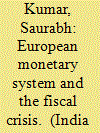

|
|
|
|
|
| Publication |
2012.
|
| Summary/Abstract |
The episode of fiscal crisis in the Euro zone has now become a recurrent theme of debate and has attracted a range of experiences regarding the nature of fiscal turmoil, its causes and effects, which vary widely across individual countries. The confidence in the European monetary system has been confounded with the European fiscal turmoil. The phases of its revival and by what method it will recoil, and at what velocity, are unanswered questions. At the centre of the European monetary system is the European Central Bank (ECB) which shapes and conducts a vigorous and complex set of policies and institutional arrangements that represent the image of neoliberal economic ideology. The debate over the European monetary system's architecture has significant ideological, economic and political implications. This article approaches the debate by assessing the monetary policy strategy and in particular the organisational structure of the ECB, and what role they play in the conduct of economic and monetary course of action in the Euro zone.
|
|
|
|
|
|
|
|
|
|
|
|
|
|
|
|
| 2 |
ID:
167962


|
|
|
|
|
| Summary/Abstract |
Popular policy accounts of Jordan's General Intelligence Directorate (GID) commonly detach it from the country's history, society, and political economy. By isolating and focusing on the GID's role as protector of the monarchy, one loses sight of other important effects of its historical evolution. This article explores the GID's origins in the late 1960s and 1970s and how it has evolved. It positions Jordan's security services as institutional and political- economic actors contributing to the decline of the Jordanian public sector and the emergence of a fiscal crisis.
|
|
|
|
|
|
|
|
|
|
|
|
|
|
|
|
| 3 |
ID:
096391
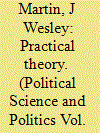

|
|
|
|
|
| Publication |
2010.
|
| Summary/Abstract |
How can philosophical instruction inform practical analysis and decision making among college students in a way that demonstrably benefits them as individual members of our polity and economy? I pose this question because each year, I introduce classic political theory to first- and second-year college students who simultaneously confront a fiscal crisis in the American state and profound financial challenges as individuals, and I want to ensure that the concepts and analytical strategies we study as theory can meet their most pressing practical needs during the first decade that they are out of college.
|
|
|
|
|
|
|
|
|
|
|
|
|
|
|
|
| 4 |
ID:
128268
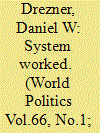

|
|
|
|
|
| Publication |
2014.
|
| Summary/Abstract |
Prior to 2008, numerous international relations scholars had predicted a looming crisis in global economic governance. Policy analysts have only reinforced this perception since the financial crisis, declaring that we live in a "G-Zero" world. This article takes a closer look at the global response to the financial crisis and reveals a more optimistic picture. Despite initial shocks that were more severe than the 1929 financial crisis, global economic governance structures responded quickly and robustly. Whether one measures results by outcomes, outputs, or process, formal and informal governance structures displayed surprising resiliency. Multilateral economic institutions performed well in crisis situations to reinforce open economic policies, especially in contrast to the 1930s. While there are areas where governance has either faltered or failed, on the whole, the system has worked. Misperceptions about global economic governance persist because the Great Recession has disproportionately affected the core economies; analysts have conflated national with global governance; and the efficacy of past periods of global economic governance has been badly overestimated. Why the system has worked better than expected remains an open question, but we can tentatively conclude that both the power of the United States and the resilience of neoliberal economic ideas were underestimated.
|
|
|
|
|
|
|
|
|
|
|
|
|
|
|
|
| 5 |
ID:
106955
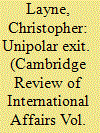

|
|
|
|
|
| Publication |
2011.
|
| Summary/Abstract |
In this article I show that the unipolar era already is drawing to a close. Three main drivers explain the impending end of the Pax Americana. First, the rise of new great powers-especially China-is transforming the international system from unipolarity to multipolarity. Second, the United States is becoming the poster child for strategic over-extension, or as Paul Kennedy dubbed it, imperial overstretch. Third, the United States' relative economic power is declining, and mounting US fiscal problems and the dollar's increasingly problematic role as the international financial system's reserve currency are undermining US hegemony. After examining how these trends undermine the argument for 'unipolar stability', I conclude by arguing that over the next two decades the Pax Americana's end presages dramatic changes in international politics.
|
|
|
|
|
|
|
|
|
|
|
|
|
|
|
|
| 6 |
ID:
130763
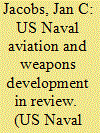

|
|
|
|
|
| Publication |
2014.
|
| Summary/Abstract |
The funding storm clouds on the horizon for the Department of Defense in 2012 came to fruition with the fiscal crisis of 2013. With Congress unable or unwilling to take action on a workable federal budget, all U.S. government agencies were required to take a cut in their funding. The resulting scramble for dollars resulted in a slowdown for the U.S. Navy in current weapon-system procurement and in establishment of new programs.
|
|
|
|
|
|
|
|
|
|
|
|
|
|
|
|
| 7 |
ID:
096389


|
|
|
|
|
| Publication |
2010.
|
| Summary/Abstract |
Despite nearly universal concern about America's rapidly rising national debt, the United States government was $12.5 trillion in debt by the spring of 2010. Yet, few people-including college and university students-understand why we are in debt, what the many effects and dangers could be, the difficult steps necessary to reduce our deficits and debt, and the critical importance of bipartisanship and compromise. Given that young people are the nation's future and knowledge is power, what better place to raise awareness and stimulate discussion than on college campuses?
|
|
|
|
|
|
|
|
|
|
|
|
|
|
|
|